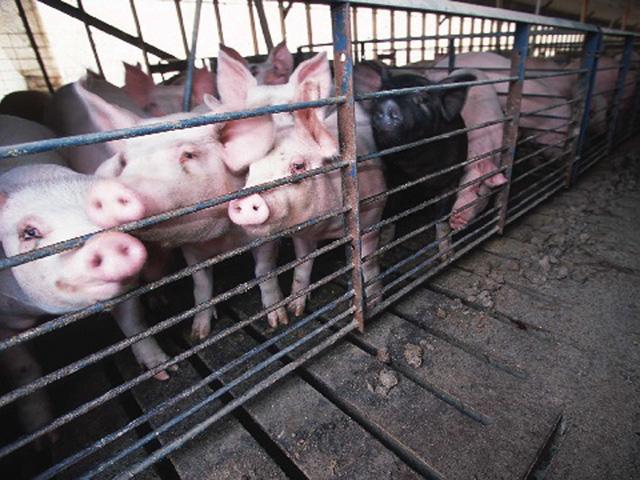Prop 12 Pork Shortages Expected in CA
California Alliance Calls on Gov. Newsom to Delay Proposition 12
LINCOLN, Neb. (DTN) -- California consumers are likely to experience sticker shock when shopping for pork after Jan. 1, 2022, when Proposition 12 takes effect.
A new white paper released by the Food Equity Alliance on Thursday said an expected 50% reduction in pork exported to California will create several problems.
The law requires hog producers to abide by certain regulations to sell pork in California. Voters in the state passed Proposition 12 in 2018 with nearly 63% of votes supporting it.
The state released for public comment a proposed rule to implement Proposition 12 just last month -- about 18 months later than required by the measure. This means pork producers across the country that export to California have fewer than six months to understand and follow the rules.
Nearly all pork consumed in California comes from out of state, according to the Food Equity Alliance. Proposition 12 requires out-of-state producers to build or remodel their facilities, essentially halting interstate commerce for pork to California.
Lon Hatamiya, former secretary of the California Technology, Trade and Commerce Agency, conducted an analysis for the Food Equity Alliance to determine how Proposition 12's implementation would affect consumers.
"Market access restrictions from Proposition 12 will further limit available supply into California, thereby driving up pork prices for all consumers," he said. "The negative financial burden falls largely on the diverse ethnic consumers and communities that make up California, with pork being an important source of protein for African American, Asian American and Hispanic households, businesses and restaurants."
P[L1] D[0x0] M[300x250] OOP[F] ADUNIT[] T[]
Once Proposition 12 is implemented, he said, consumers will have less money to spend on other items if they are required to spend more on pork. For example, a 50% reduction in available bacon would result in 60% higher bacon prices in the Los Angeles market, Hatamiya said. A 50% reduction in available pork loin would result in 42% higher pork loin prices in California.
His analysis found a 50% retail pork price increase would result in consumer loss of $224.5 million annually in Los Angeles, a $47.5 million consumer loss in Sacramento, $46.5 million consumer loss in San Diego and $84.5 million consumer loss in San Francisco/Oakland.
The Food Equity Alliance includes a number of pork producers, grocery retailers, restaurant owners, chambers of commerce and business groups. The group is calling on California Gov. Gavin Newsom to delay the implementation of Prop 12. The state faces several ongoing legal actions attempting to stop the measure.
As of Jan. 1, 2022, Proposition 12 will prohibit the sale of pork not produced according to California's production standards. Proposition 12 applies to any uncooked pork sold in the state, regardless of whether it was raised in California.
The law forbids the sale of whole pork meat in California from hogs born of sows not housed in conformity with the law. Proposition 12 forbids sows from being confined in such a way that they cannot lie down, stand up, fully extend their limbs, or turn around without touching the sides of their stalls or other animals.
At the end of 2020, the U.S. Court of Appeals for the Ninth Circuit rejected a motion for an injunction against the law. Agriculture groups and 20 states are challenging the law, alleging it violates the Commerce Clause.
"The hasty implementation of Proposition 12 greatly impacts the entire food supply chain -- from farmers and food processors to retailers, grocers, restaurants and consumers," California Retailers Association President Rachel Michelin said. "It will create food insecurity and increase food prices on small businesses and families who cannot afford it."
Julian Canete, president and CEO of the California Hispanic Chambers of Commerce said businesses and consumers would be hurt when Prop 12 takes effect.
"Imagine going to the grocery store and finding the price of bacon, pork chops or ham has skyrocketed," he said. "Or you're ordering carry out from a Latino or Asian restaurant and your favorite pork dish has been removed from the menu. These scenarios are a possibility in California with the pending implementation of Proposition 12."
Read more DTN coverage here:
"Rabobank: Prop 12 Disrupts Hog Supply," https://www.dtnpf.com/…
"Ag Groups Make Case v. Proposition 12," https://www.dtnpf.com/…
"Pork Industry Wants Prop 12 Review," https://www.dtnpf.com/…
"Pork Producers Face Prop 12 Uncertainty," https://www.dtnpf.com/…
Todd Neeley can be reached at todd.neeley@dtn.com
Follow him on Twitter @DTNeeley
(c) Copyright 2021 DTN, LLC. All rights reserved.



